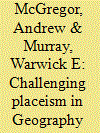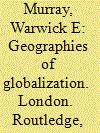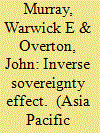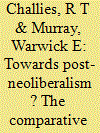|
|
|
Sort Order |
|
|
|
Items / Page
|
|
|
|
|
|
|
| Srl | Item |
| 1 |
ID:
092963


|
|
|
|
|
| Publication |
2009.
|
| Summary/Abstract |
Geography's central concern is place. Ironic, then, that it is characterised by placeist relations of power that permeate both the production and consumption of geographical knowledge.
|
|
|
|
|
|
|
|
|
|
|
|
|
|
|
|
| 2 |
ID:
095594


|
|
|
|
|
| Publication |
2010.
|
| Summary/Abstract |
This article provides a comparative investigation of education programmes intended to revitalise te reo (the language of the M?ori, indigenous to Aotearoa New Zealand) and Mapudungun (the language of the Mapuche, indigenous to Chile), respectively. The historical processes of colonisation and globalisation in Chile and Aotearoa New Zealand that have threatened indigenous language are outlined, and revitalisation efforts subsequently described and assessed. Finally, the disparities in success that the two countries have experienced in their revitalisation efforts are examined, and some recommendations made.
|
|
|
|
|
|
|
|
|
|
|
|
|
|
|
|
| 3 |
ID:
152530


|
|
|
|
|
| Summary/Abstract |
Over recent decades, the demand for bottled water has grown exponentially at the global scale. In the marketing of such products, discourses of purity and paradise have often been invoked. Marketed as a ‘Taste of Paradise’, FIJI Water has gained enormous international success as an ostensibly clean and green product. Celebrity endorsements – reaching as high as US President Barack Obama – have abounded, driven in part by the belief that the corporation is both environmentally and socially responsible. This paper describes and analyses the rise of FIJI water and critically assesses the sources and impacts of its economic success. It goes on to explore its local social and environmental impacts in the context of a country that has been subject to waves of democratic crises where the fate of the polity has been influenced by FIJI Water's actions. FIJI Water has come to assume the role of development trustee in the villages most affected by the growth in exports. The democratic crises in Fiji has given FIJI Water profound developmental influence, and this has brought both costs and benefits at the local socio-environmental scale.
|
|
|
|
|
|
|
|
|
|
|
|
|
|
|
|
| 4 |
ID:
067691


|
|
|
|
|
| Publication |
London, Routledge, 2006.
|
| Description |
xxiii, 392p.
|
| Series |
Routledge contemporary human geography series
|
| Standard Number |
0415317991
|
|
|
|
|
|
|
|
|
|
|
|
Copies: C:1/I:0,R:0,Q:0
Circulation
| Accession# | Call# | Current Location | Status | Policy | Location |
| 050657 | 303.482/MUR 050657 | Main | On Shelf | General | |
|
|
|
|
| 5 |
ID:
109469


|
|
|
|
|
| Publication |
2011.
|
| Summary/Abstract |
Theories and practices of international aid have stressed the need for the full participation of recipients. This approach has been strengthened by international agreements such as the Paris Declaration on Aid Effectiveness in 2005, which called for 'ownership' of development strategies by recipient agencies. This seemed to promise recipient governments an increased stake in the way aid was used for development and poverty alleviation. However, in practice, the new aid agenda has actually increased demands on recipients with new conditions over the management of aid funds, the setting of development strategies and the meeting of other global obligations. This issue is of particular concern in small Pacific Island states where the small size of government is coupled with increasing demands from donors for consultation, accountability and engagement to create what we argue is an 'inverse sovereignty' effect: despite the rhetoric of ownership and independence, recipient states are actually losing control over their development strategies, policies and programmes.
|
|
|
|
|
|
|
|
|
|
|
|
|
|
|
|
| 6 |
ID:
174847


|
|
|
|
|
| Summary/Abstract |
Education is one of the key objectives of, and means for, development. Its value is widely accepted though we rarely investigate the way different theories of development inform widely differing justifications and strategies for education. This article explores some of these issues and proposes five main paradigms regarding the education‐development nexus. These we term neoliberalism, retroliberalism, neostructuralism, place‐based and radical. Each is linked to particular concepts of development, each involves certain forms of education, and each is linked to particular policy discourses. Although these are largely abstract paradigms and in practice we see more hybridised forms co‐existing, we consider implications of each paradigm for education with examples from Oceania.
|
|
|
|
|
|
|
|
|
|
|
|
|
|
|
|
| 7 |
ID:
075005


|
|
|
|
|
| Publication |
2006.
|
| Summary/Abstract |
This paper examines the evolution of the dairy complexes of New Zealand and Chile in the context of increasing bilateral interaction between the two countries, and their recent signing of a 'Trans-Pacific Strategic Economic Partnership' (TPSEP) free-trade agreement. The two economies can be said to occupy semi-peripheral positions in global markets and have, through the twentieth and into the twenty-first century, increasingly competed for market share in a range of primary product (particularly agricultural)-based export markets. Similar sets of historical processes, although variably timed, have shaped the roles of New Zealand and Chile respectively as resource peripheries, and the extent to which the two countries can collaborate for mutual benefit and transcend these roles is uncertain. In taking a sectoral approach this paper questions the compatibility of the two dairy complexes in the context of the TPSEP, and recommends further sectoral and localised studies in order to better appraise the model of 'co-opetition' promoted through the agreement.
|
|
|
|
|
|
|
|
|
|
|
|
|
|
|
|
| 8 |
ID:
084433


|
|
|
|
|
| Publication |
2008.
|
| Summary/Abstract |
Abstract: This paper compares the evolution of the dominant politico-economic paradigm over the past 80 years in two 'resource periphery' nation states that have become 'models' of economic reform, New Zealand and Chile. Analysing the forces that have driven change, it traces the shared transition from a neoclassical model, through structuralist/Keynesian principles, and on to neoliberalism. The paper discusses whether the contemporary convergence around neostructural policy represents a paradigm shift or an adaptation of the neoliberal model designed to sustain free-market principles in a form that is acceptable to electorates. The paper concludes that the broad commonalities in the transitions are remarkable and come about as a result of shared external shocks as well as similar historical insertions into the global political economy. Notwithstanding the parallels, the comparative approach reminds us of the contingent unfolding of economic paradigms across space, a point that counters arguments that assert that neoliberalism, and the globalisation to which it gives rise, create a homogenous global political economy. This comparative study is timely, as the two countries have recently signed a bilateral strategic trade partnership. This agreement indicates continued pursuit of neoliberal agendas in both countries rather than, as respective governments have heralded it, a move to foster South-South cooperation.
|
|
|
|
|
|
|
|
|
|
|
|
|
|
|
|
|
|
|
|
|